
by | Nov 23, 2012
 Below is a brief overview of a bi-partisan initiative that is set to be brought to the floor of the Iowa Legislature when it gavels in next session. Once it is brought to the floor I will publish a more detailed look at it. As noted on Wednesday, Sen. Brad Zaun, Rep. Ako Abdul-Samad, and Rep. Kevin Koester have already signed on to support the measure and it will be interesting to see the reaction from both sides once the session starts.
Below is a brief overview of a bi-partisan initiative that is set to be brought to the floor of the Iowa Legislature when it gavels in next session. Once it is brought to the floor I will publish a more detailed look at it. As noted on Wednesday, Sen. Brad Zaun, Rep. Ako Abdul-Samad, and Rep. Kevin Koester have already signed on to support the measure and it will be interesting to see the reaction from both sides once the session starts.
———————————————————————————————
The Every Iowan Economic Empowerment Act or The Empowerment Act takes advantage of our state’s strengths in two ways.
I. Rewarding Hard Work & Sacrifice Provision
The first component of The Empowerment Act rewards the hard work and sacrifice of Iowans by eliminating taxation on overtime.
A. If an Iowan works an hourly or hourly jobs, after 40 hours state taxation ends. No hour worked over 40 hours is taxed whether that time is accrued at one job or a second or third job.
B. If an Iowan works a salaried position that consists of at least 40 hours per week as their primary job but works a second job that is either hourly or salaried that secondary employment will not be taxed by the state.
C. In a state with the highest per capita number of two working parent households, this rewards their sacrifice by allowing them as a household to keep more of the money they earn or allows one of the two to work less hours while the household brings home the same size weekly paycheck.
II. Capitalism & Working Class Iowa Empowerment Provision
The second component of The Empowerment Act returns to Iowans the ability to invest in and rebuild their communities while savaging rampant cronyism found in state and local gifting politics.
A. 5% Charitable Provision Each working Iowan gets 5% rebated from their individual state income tax bill and they can designate the non-profit organization or organizations of their choice to receive those funds.
B. 10% Rural Revitalization Provision Each working Iowan gets 10% rebated from their individual state income tax bill and they can designate the rural enterprise or enterprises of their choice to receive those funds.
C. 15% Entrepreneurship & Capitalist Empowerment Provision Each working Iowan gets 15% rebated from their individual state income tax bill and they can invest in any Iowa based business venture.
Implementation
1. Potential recipients for investment sign up as state vendors and provide relevant information such as their EIN, business organization charter, and banking information.
2. At tax refund time the state wires invested funds to the appropriate vendor not the taxpayer.
3. The taxpayer is responsible for vetting the investee and any collaborative efforts.
4. Demonstrable fraud is prosecuted as it would be under our current code.

by | Nov 21, 2012

Especially after the last two years of bitter political fighting in Iowa, when you hear an initiative is being co-championed by Rep. Ako Abdul-Samad, Brad Zaun and Kevin Koester–you take note.
Below is the full press release announcing this effort. Though we are closing down shop tomorrow for Thanksgiving, on Friday we will run a detailed look at the legislation so you can form your own thoughts on its merits.
————————————————————————————————————
FOR IMMEDIATE RELEASE: Tuesday, November 20, 2012
Contact:
Rev. Bobby Young, President
515-491-0905; [email protected]
Jonathan R. Narcisse, Advisor
515-770-1218; [email protected]
 Iowa Urban Initiative To Announce Economic Empowerment Act
On Wednesday, November 21 at 8:15 a.m. at Mt. Hebron Baptist Church, 1338 – 9th Street in Des Moines, the Iowa Urban Initiative will announce the Every Working Iowa Economic Empowerment Act or Empowerment Act campaign.
In addition to Pastor Bobby Young, President of the Initiative, a bi-partisan legislative effort will be headed by Sen. Brad Zaun (Rep.) of Urbandale who signed on to the effort this spring at an informational gathering for community leadership, Ast. Minority Leader Rep. Ako Abdul-Samad (Dem.) of Des Moines, Rep. Deborah Berry (Dem.) from Waterloo and Rep. Kevin Koester (Rep.) from Ankeny.
Other local and state activist are expected to be present also representing the political spectrum from those who were engaged in the Occupy movement to Tea Party leadership.
Statewide Campaign
Representatives Abdul-Samad and Berry will take the lead in promoting the Act statewide. Town Hall Forums will be held in Des Moines, Waterloo, Davenport, Cedar Rapids and Sioux City and a barnstorming media blitz will cover several communities throughout Iowa including Clinton, Dubuque, Burlington, Fairfield, Iowa City, Ottumwa, Marshalltown, Mason City, Ft. Dodge, Spencer, Council Bluffs, Ames, Storm Lake and Lee County.
Senator Zaun To Head G.O.P. Support
“The reason I am here today is to support an idea that is thinking outside the box. What we have been doing the past few decades has not been working. This is a method to empower every working Iowan – to reward people for their hard work and sacrifice; to reward Iowans by creating a way for them to invest back in their communities; to invest in their favorite non-profits; to invest in their churches and favorite organizations; to invest in rebuilding our small towns and rural Iowa; and to invest in small business and economic growth – in all 99 counties. This act will create accountability and take control from politicians and bureaucrats and put it back in the hands of the people where it belongs.”
With those words State Senator Brad Zaun (R) embraced Pastor Bobby Young, Chair of the Iowa Urban Initiative in announcing his support for the Every Working Iowan Economic Empowerment Act this spring.
Zaun stated that this Act represents not only the best of what Republicans stand for but a key to growing Iowa’s economy and population after years of decline. He especially praised the Acts shift from reliance on big government as the solution to returning power, hope and opportunity to every working Iowan.
Sen. Zaun, one of Central Iowa’s most popular and respected Republicans, was the party’s nominee for U.S. House District 3 in 2010 and is the former ranking member on the Iowa Senate’s Ways and Means committee. Zaun currently serves on the Senate’s Commerce, Rules and Administration, Transportation and Ways and Means committees and came to the Senate in 2005 after serving as Mayor of Urbandale, Iowa from 1998 to 2005.
A District In Need
“I feel this is the first step to addressing the economic needs of community – urban and rural. It gives people the opportunities to become self-sufficient and determine their own economic destiny,” stated Rep. Berry.
Berry, a former member of the Waterloo City Council, serves perhaps Iowa’s most urban district when poverty, academic woes, health disparities and rampant violence are factored in.
“Most Iowans, including our legislators and governor, can even comprehend the dire condition of this district and the plight of urban Iowans. This Act is a powerful remedy to the pain and needs we face.”
She currently serves on the Iowa House Local Government, Public Safety, Veterans Affairs committees and the Health and Human Services Appropriations Subcommittee.
We Can End Poverty
“For most of my life schemes have been introduced to revitalize urban Des Moines and urban Iowa. In Des Moines we do not see the impact of a quarter billion in federal funds on a still blighted “Model Cities” community. We do not see the benefit of trickle down economics. What we find instead is that 70% of the families with children in the Des Moines School District, our state’s largest, can not feed them without the government putting food on their table,” stated Rep. Abdul-Samad.
“This Act is vital on a number of levels,” stated Rep. Abdul-Samad whose district is in comparable shape to Rep. Berry’s.
“First it grows the Iowa economy from the ground up. Again, trickle down economics has not worked in our state. It helps small businesses with workers and capital. It helps working families retain and invest their earnings. And, it provides vital resources to those serving communities in all 99 counties; to key rural revitalization initiatives and to business ventures at every level. Finally, this Act has the potential to end poverty in Iowa. Republicans and Democrats must join together in getting this legislation passed and starting the reconstruction of our state.
Addition of Rep. Koester
“We are honored to have Rep. Koester join this effort,” stated President Young. Many Iowans are suffering. Urban Iowans are especially struggling. The addition of Rep. Koester demonstrates that this truly is a bi-partisan initiative that will help Iowans in all 99 counties. We look forward to securing the 51 votes in the House and the 26 votes in the Senate to get this to the governor’s desk,” stated President Young.

by | Jul 11, 2012
 After easily defeating a primary challenger in June, Iowa House member Kevin Koester was kind enough to sit down with The Conservative Reader: Iowa to discuss his upcoming general election in November, as well as the many issues he will be dealing with should he earn a third term in the Iowa Legislature.
After easily defeating a primary challenger in June, Iowa House member Kevin Koester was kind enough to sit down with The Conservative Reader: Iowa to discuss his upcoming general election in November, as well as the many issues he will be dealing with should he earn a third term in the Iowa Legislature.
The Primary, The General Election, and the Pulse of House District 38
The process of winning re-election for Rep. Koester began even before the legislative session ended, as the first order of business was winning a primary challenge by Saylor Township resident Brett Nelson. As the session ran long, Koester made several hundred phone calls in his downtime and began getting acquainted with the voters in his newly re-drawn House District 38.
He handily defeated Nelson 456 to 80, and took many positives away from the effort this challenge required, “I’m very grateful for both the margin of victory and for the experience of the primary because it really helped energize my campaign for November, and gave me a great familiarity with the new territory in the district.â€Â In an interesting aside, after not meeting or speaking to each other throughout the primary, the two have since met and Nelson even took up an offer by Rep. Koester to join him in a weekly bible study—a great, albeit rare, good ending to a primary challenge.
Talking to voters throughout this process affirmed to Rep. Koester that the dominant issues for his November show-down with Democrat John Phoenix will include the state budget, government over-spending, and the economy. Besides these economic issues, the background of the two candidates, combined with the issues still facing the legislature, serve to telegraph the subject matter that will be front and center in this race—education reform and public sector unions.
While Koester has decades of experience with education in Iowa, Phoenix was elected to the Des Moines School Board where he served for six years. In addition to this, Phoenix also has been a long-time union steward, has already been endorsed by the AFL-CIO, and strongly believes that “unions help make our country stronger and improve the lives of all workers.â€
Speaking to these differences, Rep. Koester believes that, “because of his role and his voice on collective bargaining issues and union viewpoints, there will be plenty of distance between us to give the voters a clear choiceâ€. Given the fact that Mr. Koester is a strong Conservative Republican and Phoenix is a pro-union, former school board member who featured Des Moines super-liberal Ako Abdul-Samad at his first fundraiser—the gulf between the two is likely to be enormous on a long list of issues. Here is a look at two of these issues, and where Rep. Koester stands on them.
Education Reform
Like most Iowa Republicans, Mr. Koester was very disappointed in the progress made on education reform by the last General Assembly. “The things we voted on last session were not reforms, they were Band-Aids. We did not do surgery, and that is what is truly needed.â€
After seeing countless specific and detailed proposals get torn apart by the opposing sides, he stands ready to work on a broad frame of reform that can be agreed on in principle and passed. “What I have is a drive to dismantle the fluff, and no patience for the simple arguments that only serve to attack valid ideas. We need to stop the nit picking and the warring, and come up with a product and move forward on it.â€
Two realities in the current system that he sees as negatively affecting students are the lack of teachers being removed for poor performance and the practice of “last in first outâ€, which is the seniority structure that protects long-time teachers from being let go, in favor of removing less tenured teachers when staff sizes are cut. This practice has long been under fire by Republicans because it refuses to take into account the skill level and effectiveness of each teacher. “Last in first out is bad for kids. We need to look at who is performing and have that be the prime focus, and not necessarily just who has the most experience. A pay raise needs to be given for performing better, not just given out for coming back the next year and being a year olderâ€.
In terms of the reforms needed to reverse our recent embarrassing trend in education, the crucial ingredient in Rep. Koester’s view is to quantify the performance of the employees in our education system. He will not support any proposal without this component, and he concisely summed up his position on education by saying:
We will have meaningful and fundamental reform when we agree on how we are going to measure student learning, how we are going to measure each of our Principal’s leadership and influence in the classroom, and how we are going to measure teachers and instruction. That is where the rubber meets the road on this issue.
Unions and Collective Bargaining
With Governor Branstad recently signaling a desire to look at their financial impact on the state, and John Phoenix’s close personal ties to them, there is little doubt that public sector unions and collective bargaining will be hotly debated in this race.
Rep. Koester has already taken several votes on this issue, all with the goal of bringing public sector unions more in line with the realities of the private sector, and attempting to prevent the payouts involved from breaking the bank as we have seen in several other states in recent years.
The votes he has taken include voting three times for employees of the Legislative branch, including himself, to pay a portion of their health insurance cost. The first was for a contribution of $50 a month, the second for a $100 a month, and the third for $200 a month. “I have gone on record every opportunity I have had insisting that Legislators are charged something, and I strongly believe that all state employees should help pay for the cost of their health insurance.â€
He also voted in favor of the measure that went into effect July 1st, which changed the formula for calculating retirement benefits for state employees. In the past payouts were figured using an average of an employee’s top three wage earning years, which has now been changed to take the average of the top five years.
In the larger picture, he supports having a policy ensuring that the number of government employees does not swell beyond what is needed and can be financially sustained in the long run. To this end he favors implementing breaks on the growth of state government that ties the number of workers and salaries to the overall growth of our state economy, and prioritizes the issue the following way:
I want to start with how we plan for how many state jobs there will be. You don’t grow the economy by growing the number of public jobs—that is socialism. The second thing is then addressing the disproportions in the health insurance contributions and the retirement benefits. The benefits are out of control compared to what the private sector is doing, and to what Iowa taxpayers are doing to take care of their families. We need to get those things in line, and what is fair for the rest of Iowans should be fair for the public employees that they are paying for.
Next Stop: November
Anyone who talks issues with Rep. Koester immediately realizes that he has a deep grasp on nearly all of them, including all the moving parts involved with each. On substance, he can go toe-to-toe with anyone and will shine in the public forums and debates with Mr. Phoenix.
As this contest slowly unfolds till November, the topics these two candidates debate along the way will be a roll call of every major issue facing the citizens of Iowa. In particular, the colliding ideologies on taxes, education, and public sector unions will be a true foreshadowing of the debates that will consume the next General Assembly.
How strong a candidate John Phoenix will be remains to be seen, but Republicans throughout Iowa and HD 38 can be assured that Kevin Koester is up to the challenge—and will remain a strong Conservative voice for the Party in the coming years.

by Art Smith | Dec 31, 2010
 After 5 ballots, Jack Whitver tonight won the Republican Nomination for the special election in Senate District 35 at a nominating convention held at the Kirkendall Public Library in Ankeny.
After 5 ballots, Jack Whitver tonight won the Republican Nomination for the special election in Senate District 35 at a nominating convention held at the Kirkendall Public Library in Ankeny.
“I’m honored to be the Party’s nominee and I intend to keep the seat in the Republican column. I promise to keep promoting conservative values in the state of Iowa,†said the local business owner and law student.  Jack, his wife Rachel and their newborn daughter live in Ankeny.
Whitver will face a candidate to be selected by Democrats on Tuesday January 18th. Democrats will select a candidate on Monday of next week (January 3rd) to oppose Whitver.
Highlights from tonight’s convention in Senate District 35.
Meeting opened with full room… standing room only. Jim Kirkenbach convened as was immediately elected as the convention chair. Gopal Krishna was elected secretary.
The rules were presented. Â A motion to modify the rules to allow discussion amongst the body after speeches and before voting failed. The rules were then approved as written.
The following people were nominated:
- Matthew DeVries
- Larry Voorhees
- Carol Miller
- Jim Gocke
- Kevin Koester
- Jack Whitver
A delegate asked the candidates to “…not surprise us with something from your past … tell us what you need to tonight.”
Matt DeVries gave a good speech. He covered a number of the expected conservative topics… including the comment that “abortion is an act of violence”.
Jim Gocke talked a lot about his background growing up and how it affected his mindset. Different events “sharpened my pencil”. Â No clear message on positions, although he did handout information as well. Â Jim is pretty well known in the community through his law practice.
Kevin Koester shared some family background. He said that his positions are well documented… jokingly shared about some family nefariousness.  He made a strong case for using his experience in the House to shepard key legislation through the Senate.  Kevin was reelected in November as the representative for Iowa House District 70, which makes up half of Iowa Senate District 35.
Carol Miller is a farm wife… agriculture is a large part of this district (District 35 is largely rural). She has a history of various roles representing the interest of agriculture and general public policy, including travelling to DC to address policy issues.
Larry Voorhees said he “doesn’t like liberalism and doesn’t like empty ballots”. In 2008 he ran for Iowa House in District 68 against Democrat Rick Olson even though the odds were against him. He “won’t roll over and play dead”. He explained his position on abortion as unwavering with no exceptions.
Jack Whitver gave a very solid speech, covering several key conservative topics, as Matt did, at one point stating that it was “wrong to mislead Iowans by telling them we have a blanced budget”. Â Jack wants term-limits. Â He said that “voters now see the weakness of big government” and are expecting substantive change. Â Below is a video of Jack’s speech, courtesy of The Iowa Republican (Craig Robinson).
[wp-youtube-hd]2CUlJ9aGBDg[/wp-youtube-hd]
Any of these candidates seemed very likely to serve Republicans well.
Ballots were immediately provided.
First ballot:
- Devries 21.3
- Gocke 34.1
- Koester 12.7
- Miller .7
- Voorhees 0
- Whitver 28.7
Larry Voorhees withdrew.
Second bellot:
- Devries 20.5
- Gocke 36.2
- Koester 6.6
- Miller 0
- Whitver 36.7
Carol Miller is then dropped since the rules stipulate that after the second ballot, the person with the least votes in each round is dropped.
Third ballot:
- Devries 20.8
- Gocke 39.4
- Koester 3.3
- Whitver 36.4
Koester drops by rules
Fourth ballot:
- Devries 16.9
- Gocke 39.4
- Whitver 45
DeVries drops by rules
Fifth and final ballot:
Jim Gocke gave a short speech followed by an equally short acceptance speech from Jack.
Kudos to those running the meeting… very efficient. Â And the crowd was very engaged but polite. Â A very pleasant experience.
Craig Robinson at The Iowa Republican has a great write-up of the event as well.
~ ~ ~ ~ ~
I sat through the convention in the back with Craig Robinson, who runs The Iowa Republican web site. Â Craig is fun to work with, and he never has his own access to the internet at events like this. Â I had my recently acquired cellular hotspot with me and I was happy to share it with Craig, but it would not work properly (still not sure why… I will have to work on it tomorrow). Â The wireless at the library was not strong enough to work for us, so we did all of our tweeting from our phones.
Anyhow, Craig predicted that IF the voting went to five ballots, Jack Whitver would be the winner. Â Craig Robinson was Nostradamus.

 Below is a brief overview of a bi-partisan initiative that is set to be brought to the floor of the Iowa Legislature when it gavels in next session. Once it is brought to the floor I will publish a more detailed look at it. As noted on Wednesday, Sen. Brad Zaun, Rep. Ako Abdul-Samad, and Rep. Kevin Koester have already signed on to support the measure and it will be interesting to see the reaction from both sides once the session starts.
Below is a brief overview of a bi-partisan initiative that is set to be brought to the floor of the Iowa Legislature when it gavels in next session. Once it is brought to the floor I will publish a more detailed look at it. As noted on Wednesday, Sen. Brad Zaun, Rep. Ako Abdul-Samad, and Rep. Kevin Koester have already signed on to support the measure and it will be interesting to see the reaction from both sides once the session starts.




